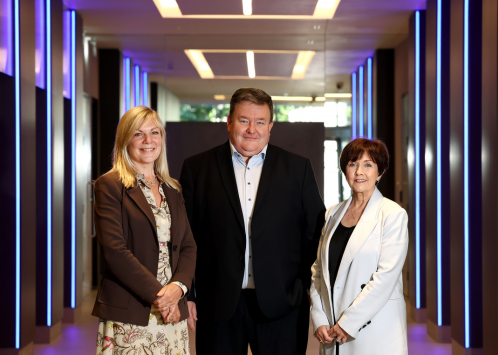- 62% of NI Chamber members are positive that turnover will grow in the next 12 months
- 4 in 5 respondents are trading well or reasonably
- 44% are positive about the Windsor Framework’s potential impact on their business
- 74% are very concerned about the impact of public spending cuts on the Northern Ireland economy
Business confidence in Northern Ireland improved in Q2 23 and there are signs that some cost pressures are easing, according to the most recent Quarterly Economic Survey (QES) report from Northern Ireland Chamber of Commerce and Industry (NI Chamber) and BDO NI.
Trading performance for businesses was largely positive in Q2 23, however inflation remains a dominant concern and labour costs persist in putting pressure on prices. 74% of businesses are very concerned about the impact of public sector spending cuts on the Northern Ireland economy, while one in three are particularly concerned about the impact on their own organisation.
Most key indicators in the Northern Ireland survey were positive, meaning that in the second quarter of the year, more firms were reporting increasing export sales, employment growth, confidence around turnover and profits and investment intentions than those reporting any fall.
4 in 5 survey respondents said they were trading well or reasonably, with 1 in 5 just covering costs or struggling. More than half of members reported a slowdown in demand (53%) although this has eased from Q4 2022 when it rose to 64%. Most have seen only a little slowdown (43%) while 10% have seen demand for their products/services slow down significantly.
The region’s overall domestic performance improved, with more businesses reporting increased domestic (UK) sales in the last three months (35%) compared to those reporting a fall (23%). Export performance showed continued improvement, with 33% reporting improving order books for the next three months compared to 26% reporting a fall.
Prices and costs
Expectations to raise prices showed signs of easing. In Q2 23, 46% of members reported that they expected to raise prices, down from 60% in Q1 23 and 75% in Q4 22. However, inflation continues to dominate as a key concern. In Q2 23, 76% of manufacturers reported inflation as a greater concern than three months ago. For service businesses, the figure is 74%.
Whilst recruitment activity is holding up well, with 72% trying to recruit in Q2 23, rising labour costs are a significant concern, with three in four members reporting that labour costs are feeding into expectations to raise prices. Fewer manufacturers are reporting price pressures from raw material costs but this still remains high at 73% in Q2 23 (92% of manufacturers in Q2 22). Fewer firms are also reporting pressure from utility costs, particularly for manufacturers where 64% of businesses are reporting utility costs as a pressure to prices, down from 91% in Q2 22. Fuel cost pressures have also reduced considerably.
Interest rates are a growing concern in both sectors, with 40% of manufacturers and 48% of services reporting it as more of a concern than three months ago. The pace of energy cost inflation appears to be slowing although costs are still rising for most. In Q2 23, 80% of members said energy costs had risen, down from 90% in Q1 23.
Trading arrangements
In Q2 23 members were asked about the potential impact of the Windsor Framework on their business and the economy. The findings highlight that 44% of members are positive about the Windsor Framework’s potential impact on their business, while 56% feel positively about the impact on the economy. Only 4% are negative about the impact on their business. However, 1 in 5 are less sure in that 15% think it’s too early to say and 5% do not understand what the Windsor Framework means for their business.
Regional Position
In the past, Northern Ireland has typically ranked among the bottom performing UK regions across most of the QES key indicators. However, in recent quarters its regional ranking has generally been more positive.
In Q2 23, Northern Ireland ranks in top 4 UK regions for 9 of the 11 key indicators for manufacturing. Its highest regional ranking is 2nd relating to investment intentions around plant and machinery. In services, Northern Ireland’s regional position continues to be relatively strong. Northern Ireland ranks as the top region for 4 of the 11 indicators, including employment activity in the last 3 months, investment intentions in both training and plant/machinery and confidence in turnover growth in the next 12 months.
Commenting on the survey findings, Suzanne Wylie, Chief Executive, NI Chamber, said: “The findings clearly demonstrate the resilience of business through a protracted period of challenges. It is encouraging to see the stabilisation of business confidence in the first half of 2023, with a strong performance across so many indicators relative to other UK regions albeit that there remain significant challenges to growth in both the NI and UK’s economies.
“However, the most alarming aspect of the findings this quarter is the perceived impact of Stormont’s fiscal problems on the economy and individual firms. It serves as a timely reminder that a sustainably funded, functioning Executive is the missing piece in unlocking Northern Ireland’s potential and driving confidence and growth.”
Brian Murphy, Managing Partner, BDO NI, added: “Positive momentum and consistency are the order of the day and businesses across Northern Ireland are clearly demonstrating both. Considering the difficult conditions many organisations are operating in, achieving any degree of positive momentum really is remarkable and it shows that the business community is continuing to strive for sustainable economic growth.
“Confidence continues to grow, with 62% of companies positive that turnover will grow in the next 12 months, this is up 2% from Q1 2023 and more significantly up 15% on the last quarter of 2022, demonstrating real time progress. This is not to say that businesses are not under pressure, nor does it imply the challenges around recruitment, skills and costs have dissipated. What it does demonstrate is that businesses are learning to operate and grow whilst simultaneously dealing with a range of challenges.
“The local business community certainly does not rest on its laurels. Across the board, businesses have adapted and transformed their offering to meet the changing needs and demands of their market, identifying opportunities for investment and collaboration as they go.”


